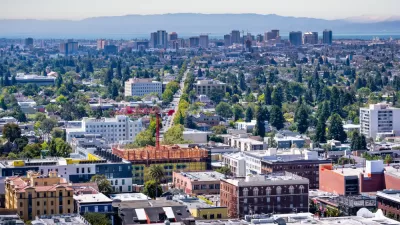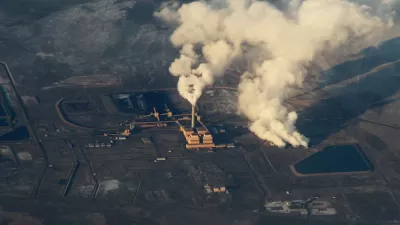Two weeks after Berkeley became the nation's first city to outlaw natural gas lines in new buildings, the California Public Utilities Commission voted to update an old regulation to allow funding for 'fuel switching' from gas to electric appliances.

"The billion dollars spent annually on energy efficiency in California is now also open to technologies that will help customers switch from gas to electricity for such uses as space heating and hot water," writes senior scientist Merrian Borgeson for the Natural Resources Defense Council (NRDC) about a unanimous vote by the California Public Utilities Commission (CPUC) at their August 1 meeting to change a 27-year-old regulation.
Thursday's rule change [pdf] was the culmination of a motion [pdf] made by NRDC, the Sierra Club, and what is now the California Efficiency + Demand Management Council, in June 2017, to review and modify what is known as the 'three-prong test' which essentially served "to avoid encouraging programs that substitute electricity for natural gas," writes Robert Walton for Utility Dive (source article). The prongs refer to metrics for BTU consumption, resource costs, and environmental impact.
The change "unlocks an amount of funding that has the potential to really transform the marketplace for energy efficient appliances," Sierra Club Regional Campaign Manager Evan Gillespie told Utility Dive.
"There are at least 30 years of policy and regulations that have been built out to prefer gas. ... For building electrification to succeed, it has to cut through an enormous amount of regulatory bias that disadvantages heat pumps and other appliances."
Why the tight restrictions to guard against fuel substitution?
Coal was a major source of California's electricity generation decades ago. Since natural gas is cleaner, it made sense to guard against switching to more polluting power sources. "But this no longer makes any sense today," wrote Rachel Golden.
We now have super-efficient electric appliances like “heat pumps” that use 3-4 times less energy than conventional heaters, and can be powered by rooftop solar or the state’s increasingly low-carbon grid.
According to Senate Bill 100, in just over 10 years, 60 percent of the state's electrical generation must be from carbon-free sources, and be net zero by 2045.
Berkeley precedent
The rule change shouldn't be confused with the unprecedented action taken by the Berkeley City Council on July 16 to ban natural gas infrastructure in most new buildings, aimed at achieving building electrification or decarbonization. The CPUC decision merely allows energy efficiency funds to be spent on new technologies powered by electricity.
Buildings now accounting for the state's second-highest source of greenhouse gas emissions after transportation. Borgeson writes that "building electrification using efficient space and water heating technologies that are commercially available today presents the lowest-cost and lowest-risk pathway for buildings to contribute to the state’s decarbonization goals."
Not all were pleased with the commission's action, though. Southern California Gas (SoCal Gas), the nation's largest gas distribution company said the new rules will "remove or reduce ratepayer protections" and obscure the real cost of some efficiency efforts, adds Walton.
Related in Planetizen:
Hat tip to Jim Stewart.
FULL STORY: California opens $1B in efficiency funding to electrification

Alabama: Trump Terminates Settlements for Black Communities Harmed By Raw Sewage
Trump deemed the landmark civil rights agreement “illegal DEI and environmental justice policy.”

Study: Maui’s Plan to Convert Vacation Rentals to Long-Term Housing Could Cause Nearly $1 Billion Economic Loss
The plan would reduce visitor accommodation by 25% resulting in 1,900 jobs lost.

Planetizen Federal Action Tracker
A weekly monitor of how Trump’s orders and actions are impacting planners and planning in America.

Waymo Gets Permission to Map SF’s Market Street
If allowed to operate on the traffic-restricted street, Waymo’s autonomous taxis would have a leg up over ride-hailing competitors — and counter the city’s efforts to grow bike and pedestrian on the thoroughfare.

Parklet Symposium Highlights the Success of Shared Spaces
Parklets got a boost during the Covid-19 pandemic, when the concept was translated to outdoor dining programs that offered restaurants a lifeline during the shutdown.

Federal Homelessness Agency Places Entire Staff on Leave
The U.S. Interagency Council on Homelessness is the only federal agency dedicated to preventing and ending homelessness.
Urban Design for Planners 1: Software Tools
This six-course series explores essential urban design concepts using open source software and equips planners with the tools they need to participate fully in the urban design process.
Planning for Universal Design
Learn the tools for implementing Universal Design in planning regulations.
Caltrans
Smith Gee Studio
Institute for Housing and Urban Development Studies (IHS)
City of Grandview
Harvard GSD Executive Education
Toledo-Lucas County Plan Commissions
Salt Lake City
NYU Wagner Graduate School of Public Service





























